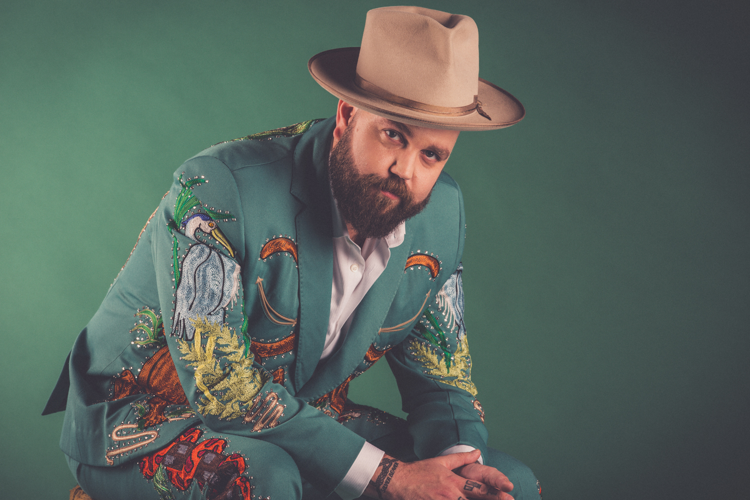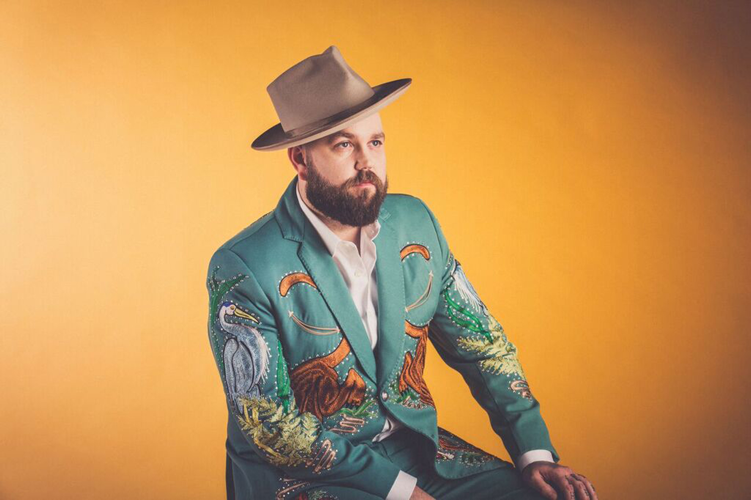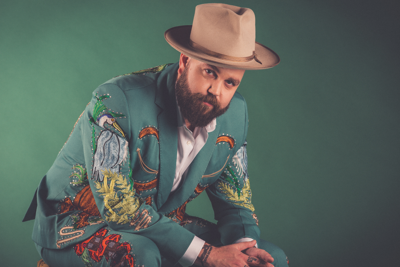If you’ve ever spent an evening at Robert’s Western World, there’s a good chance you’ve already seen Joshua Hedley perform. Known for his otherworldly vocals and world-class musicianship, Hedley has entertained crowds at Robert’s since he was a teenager. Later, he split his time between the Robert’s stage and playing fiddle and guitar with musicians like Jonny Fritz and Justin Townes Earle. That kind of musical education, doled out in lengthy sets of cover songs, paltry tips and many late nights, served as the foundation for what would become Hedley’s debut album Mr. Jukebox, out via Third Man Records this Friday.
“I had some formal training when I first moved [to Nashville],” Hedley tells the Scene, sitting down at an East Side coffee shop. “It fell by the wayside when I started playing downtown. That’s the best training you can get as a singer, is just doing it. I always say the best musical training you can get is getting onstage in front of a big group of people and failing miserably.”
Listening to Mr. Jukebox, it’s hard to imagine Hedley ever failing, by anyone’s measure. The album, which features nine original songs and a cover of “When You Wish Upon a Star,” is a dazzling introduction to a man some have called “the Mayor of Lower Broad,” as well as a master class in ’60s country music history. Credit for those accomplishments is due both to Hedley’s vision and a crack team of collaborators that includes producers Jordan Lehning and Skylar Wilson.
But it almost didn’t happen. Hedley never set out to be a capital-A Artist. He was happy to perform at Robert’s and take occasional solo treks to Australia.
“There were a lot of reasons I didn’t want to do it,” he says. “I was drinking a lot, so I just didn’t give a shit about really anything. I had a pretty comfortable life. … I knew if I made a record, based on how many people were wanting me to make one, I knew that things would change, and I was kind of afraid of the unknown. I wanted to stay in my little cocoon of normalcy.”
What finally spurred Hedley to record his music was practicality. He needed merch to sell at his shows, and T-shirts and koozies just weren’t cutting it. While that might not play into the romantic narrative we often ascribe to our favorite artists, it’s a realistic one, particularly in an age when making a living as a musician is only getting more difficult.
“I never thought I could afford to make a record,” Hedley says. “But one day I was like, ‘I’m just going to cut these four songs. I’m going to book the studio time, and I’m going to worry about how I pay for it later. I’ll figure it out.’ And it worked out.”
That EP landed in the hands of Third Man Records co-founder Ben Swank, who passed it on to his boss Jack White, who soon offered Hedley a deal. Having followed Margo Price to become the second country artist on Third Man’s roster, Hedley began writing material for Mr. Jukebox. What followed was a creative outpouring, and he cites getting sober as one major factor in his process. But his productivity would have surprised him under most circumstances, since he’d long considered himself primarily a performer.

“I don’t really consider myself a songwriter, per se, because it’s not something that I set out to do,” he says. “One of the main motivations for me to start writing was that nobody was really writing the songs that I wanted to sing. … I might have to do some editing later, but it all just sort of flows out, and I don’t really think about it. Tom T. Hall says he has to write two songs before he can leave the house every day. And I can’t do that. That’s a songwriter to me. That’s somebody who is a songwriter. I just write songs.”
Take even a cursory listen to Mr. Jukebox, though, and you’ll find that Hedley’s a real-deal songwriter. Cuts like the bittersweet shuffle “These Walls,” with its catalog of the sights and sounds of heartbreak, or the title track, which illuminates with a neon glow the always-a-bridesmaid life of a bar singer, reveal Hedley to be a gifted lyricist with an eye for detail to go with his astoundingly pretty voice. “Weird Thought Thinker,” with its bouncy cadence akin to Marty Robbins’ “El Paso,” gives a hint at what songwriting gives back to the singer: “I can get mighty squirrelly / A little bit surly / Everything changes when you’re movin’ along / Uncomfortable silence / We’ll leave that behind us / And write it all down in the words of a song.”
Hedley has transcended bar-band life, at least for the time being. He’s made an album and is preparing to hit the road with a set list all his own. So is this the life for him? He pauses before answering.
“Regardless of what happens, I want to keep making records,” he says. “I really enjoyed that process, more than I thought I would. I don’t know how this record is going to pan out. It’s either going to tap into some kind of market that hasn’t been explored, or I’m going to find out real fast why no one’s making this music. But it doesn’t matter to me what happens. I’m going to keep making records, even if I have to put them out myself.”







